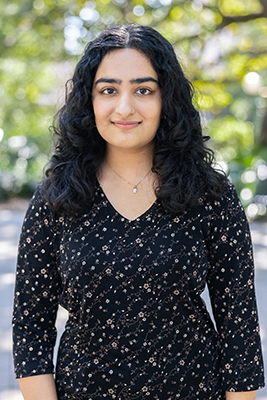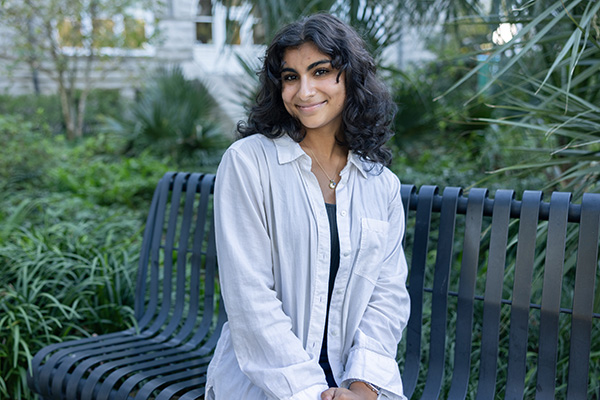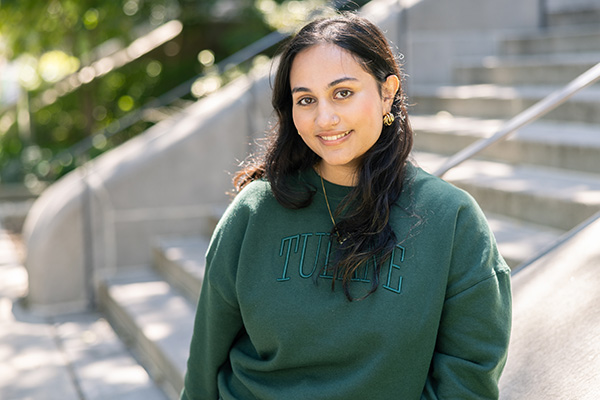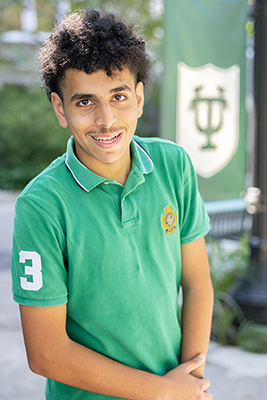Muslim Identity Project Student Interview Responses

Areej Khatri
B.S. Cell and Molecular Biology Candidate
Muslim Student Association President
I think we as Muslims, especially those of us growing up surrounded by American culture, often focus on what we can’t do because of our faith. I can’t drink or eat pork or date. However, being Muslim also means that I can find solace in my faith when the world doesn’t seem to make sense or if I’m going through hardship. It means that I can find a community of people that share my morals and values wherever I am. Islam to me is a religion that is best practiced alongside others, and that companionship is what I hold dear to me when thinking about being Muslim.
Honestly, it’s been a mixed bag. On one hand, the Muslim community we’ve cultivated at Tulane is one of the most genuine and supportive groups of people I have in my life, and I’m really proud of how much we’ve grown the MSA both membership and activity-wise. On the other, it can be difficult as a Muslim on campus; people often assume things about you just based on your faith. I’ve had uncomfortable experiences with individuals asking why I don’t wear hijab, don’t participate in certain aspects of college culture, and so on. Overall though, it has been eventful and fulfilling to be a Muslim at Tulane, especially with the support of other Muslims on campus.
We might be small, but we are here! There’s so much that we do on campus as the MSA, and I want to encourage anyone, Muslim or otherwise, to engage with us if they have the interest.
Because Islam is such a wide-spread and global religion, the way that it manifests in the context of different cultures means that the way each Muslim practices their religion can differ quite wildly. In my case, I am the child of Pakistani immigrants and was born and raised in the United States, meaning that my interpretation of Islam is informed by these identities. We aren’t a monolith at all; there’s so much variety in how each of us interprets Islam through our culture, environment, and experiences, and that’s reflected even through the smaller Muslim population here on campus.
It can be tough, but it’s very worth it. I think back to my freshman year, and how lost I felt with my faith after being away from home for the first time. It came to head during Ramadan, the month we fast from sunup to sundown, and I missed my family and the traditions we did when I was home. However, I was truly able to feel like I belonged through the MSA and their iftar dinner events, and even experiencing more spontaneous things with other MSA members like eating our pre-dawn meal in the parking lot of a Waffle House because it was too late to get back to campus. For me, being a Muslim at Tulane is truly about community and the bonds we forge because of it. It’s all about welcoming other Muslims and giving them a place where they can feel supported, and being supported in turn.

Ariana Virani
B.A. International Development & B.S. Business Management Candidate | Tulane University Class of 2025
Altman Scholar | Cohort 2025
Being Muslim has taught me bravery; not just through beliefs and traditions, but through the connections and communities it fosters. I’ve learned that true courage often lies in supporting one another and standing up for our values.
Growing up in the South, I was often the only Muslim in the classroom. While my religious community offered me comfort, it made me feel alienated from my classmates. I longed to participate in activities like church cello practices or intramural sports, fearing I might lose friends because I struggled to relate to their shared experiences. Being Muslim isn’t always viewed positively, so I learned to keep my faith under wraps. I embraced aspects of my identity that others found easier to accept by wearing beautiful Indian clothes and sharing intriguing languages and souvenirs from my East African heritage. I distanced myself from my religion, hoping these other defining traits would help me find community in spaces where I felt underrepresented.
Coming to college shifted this perspective. After the pandemic, I felt hollow and disconnected from my identity as a Muslim. While Tulane offered the academic opportunities I sought, attending another predominantly white institution in a state with few Muslims meant further distancing myself from an essential part of my identity. I took time to reflect on my feelings about Islam and realized my uncertainties stemmed from fear—fear of being othered, needing to justify my beliefs, and experiencing the discrimination faced by many in our Ummah, the Muslim community, worldwide. Confronting this fear compelled me to recognize the privilege I hold as a Muslim in my community. I have the freedom to express my religious values and beliefs openly, to speak out on issues affecting our Ummah, and to effect change on a grassroots level. My fear not only held me back as an individual but also hindered those around me who could benefit from my bravery and willingness to stand up for my community.
Ultimately, embracing my identity as a Muslim has become an act of courage in itself. By confronting my fears, I’ve learned that true bravery lies in a willingness to act and speak out even when you experience fear and apprehension. I now recognize that my experiences and voice can contribute to a more empowering narrative, speaking out for the global Muslim community and fostering a world in which being Muslim is simply a fact of life, not a source of misunderstanding or division
My experiences as a Muslim student at Tulane have been profoundly shaped by the kindness and support of upperclassmen. From the moment I arrived, they warmly welcomed me into the community, consistently checking in to ensure I was adjusting well and feeling included at Tulane. Their genuine care made a significant difference, helping me feel at home and deeply valued in my new environment. I built a community grounded in loving kindness and radical acceptance, with ongoing opportunities to expand my understanding of Islam and our Ummah as a whole. Moving to Tulane allowed me to connect more deeply with my religious community, especially given our close relationships and the limited presence of our group on campus. The Muslim Student Association (MSA) has been instrumental in bridging students of diverse identities and intersections, uniting us under our shared beliefs and ethical principles. In a school where many Muslim-identifying students struggle to find representation, MSA consistently serves as a vital point of connection and shared experience. With the support of Tulane’s faculty, staff, and student body, I hope MSA’s presence will expand beyond mere tolerance to genuine acceptance and embrace.
I am a member of the Ismaili Nizari sect of Islam. Representing less than 1% of the global Ummah, the beliefs and traditions of Ismaili Muslims are not commonly understood or shared, even by the Muslim community. A unique aspect of Ismailism is our emphasis on using reason and intellect to understand Islam, seeing it as a dynamic and evolving tradition rather than a fixed set of rules and traditions.
The most important aspect of Ismailism is our focus on creating community. At the heart of our faith is the belief that individual spirituality is inextricably connected with the collective experience of the Ismaili community. Our community embodies Ismaili values such as compassion, mutual respect, and shared upliftment. Furthermore, Ismailis are encouraged to engage beyond our religious circles, actively participating in alleviating societal difficulties and advocating for social justice and humanitarian efforts. By collaborating on local and international projects that benefit not just our community but society at large, we uphold the tenet of service that is central to broader Islamic beliefs and practices.
I use my religious community as an example of the fact that there’s no single way to be Muslim. Being Muslim is a nuanced identity that lacks rigidity. Islam encompasses a beautifully diverse set of ethnic practices, interpretations of religious texts, and interactions with the broader Muslim world. Oversimplifying the religion to common stereotyping and generalizations would overlook countless individual experiences. Recognizing the depth within the Ummah allows us to embrace both what unites us as a global community and the rich tapestry of our unique experiences


